RISD Debates in AI
All Episodes
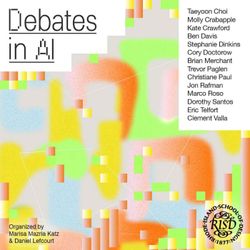
15. RISD Debates in AI: Jon Rafman
50:21||Season 1, Ep. 15This Debates in AI talk features Jon Rafman, an artist renowned for his exploration of digital cultures through video, animation, photography, sculpture and installation. His work, deeply infused with an anthropological point of view, delves into the complexities of life in the digital age, addressing themes of alienation, nostalgia and the quest for connection. Rafman’s notable projects include The Nine Eyes of Google Street View, capturing unexpected moments of humanity within Google Maps, and films like Codes of Honor and Dream Journal 2016–2019 that investigate niche Internet subcultures and personal dreams mixed with mythological and pop culture narratives. His art, often accompanied by experimental-electro soundtracks, invites viewers into immersive installations, challenging perceptions of technology’s role in shaping human experiences.Introducing him and talking with him after his talk is Debates of AI co-curator Marco Roso. Marco is a co-founder of the New York-based art collective DIS, has been innovating at the intersection of art, media and technology since launching DIS Magazine in 2010. DIS explores the boundaries of content creation and distribution, from fashion and critical essays to artist-made stock images and collaborative products. The collective shifted focus in 2018 to their streaming platform, dis.art, expanding art’s reach into education and entertainment. DIS has made significant contributions to contemporary art, curating the ninth Berlin Biennale and participating in exhibitions worldwide, including at MoMA and the New Museum. Their latest project, Everything but the World, ventures into TV, showcasing their ongoing exploration of new narratives and histories.To watch talks from the two-day symposium, head over to AI-Debates.risd.edu. You can also listen to each of them wherever you find your podcasts. Support for the event was from the Divisions of Liberal Arts, Experimental and Foundation Studies, and Architecture & Design, as well as the Fleet Library and the Center for Arts and Language. Thank you to our largest contributor, the Center for Complexity and the RISD 2050 Fund for kicking off this important conversation.Audio produced by Andrew Grant and Marisa Mazria KatzMusic: "Imagery" and "Last Night" by Xylo-Ziko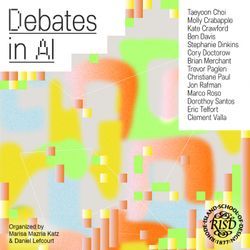
14. RISD Debates in AI: Kate Crawford
01:30:03||Season 1, Ep. 14Kicking off the Debates in AI symposium was Kate Crawford. Kate Crawford is a leading scholar of AI, artist, and author of Atlas of AI: Power, Politics, and the Planetary Costs of Artificial Intelligence. A preeminent expert in the social and political aspects of artificial intelligence (AI), Kate has spent 20 years analyzing data systems, machine learning and AI's impact on society. A research professor at USC Annenberg, senior principal researcher at MSR-NYC and honorary professor at the University of Sydney, she leads at the intersection of technology and justice. Crawford co-founded influential research groups like FATE and the AI Now Institute, advising entities from the UN to the White House. Her works, including the acclaimed Atlas of AI, span academic journals to news publications like The New York Times. Her collaborations, like Anatomy of an AI System, have garnered international awards, highlighting her role in shaping the discourse on technology’s global influence.Following her lecture she sits down for a conversation and Q&A moderated by Artnet News National Art Critic and author Ben Davis. Ben is the author of 9.5 Theses on Art and Class (Haymarket, 2013), which ARTnews named one of the best art books of the decade in 2019, and Art in the After-Culture (Haymarket, 2022). His writings have also been featured in The New York Times, New York Magazine, The Baffler, Jacobin, Slate, Salvage, e-Flux Journal, Frieze and many other outlets. In 2019, Nieman Journalism Lab reported that he was one of the five most influential art critics in the United States. He lives in Brooklyn.To watch talks from the two-day symposium, head over to AI-Debates.risd.edu. You can also listen to each of them wherever you find your podcasts. Support for the event was from the Divisions of Liberal Arts, Experimental and Foundation Studies, and Architecture & Design, as well as the Fleet Library and the Center for Arts and Language. Thank you to our largest contributor, the Center for Complexity and the RISD 2050 Fund for kicking off this important conversation.Audio produced by Andrew Grant and Marisa Mazria KatzMusic: "Imagery" and "Last Night" by Xylo-Ziko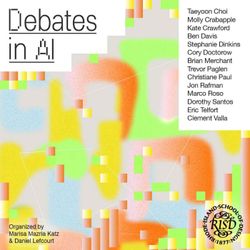
13. RISD Debates in AI: Poetics of Computation Panel
38:22||Season 1, Ep. 13Christiane Paul (curator of digital art, Whitney Museum of American Art), Taeyoon Choi (co-founder of the School for Poetic Computation), and Dorothy R. Santos (writer, artist, educator) present and discuss the poetics of computation and computational literacy. Clement Valla (RISD professor and Computation, Technology, and Culture coordinator) moderated the conversation.To watch talks from the two-day symposium, head over to AI-Debates.risd.edu. You can also listen to each of them wherever you find your podcasts. Support for the event was from the Divisions of Liberal Arts, Experimental and Foundation Studies, and Architecture & Design, as well as the Fleet Library and the Center for Arts and Language. Thank you to our largest contributor, the Center for Complexity and the RISD 2050 Fund for kicking off this important conversation.Audio produced by Andrew Grant and Marisa Mazria Katz Music: "Imagery" and "Last Night" by Xylo-Ziko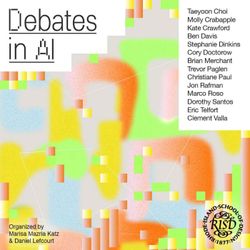
12. RISD Debates in AI: Taeyoon Choi
20:29||Season 1, Ep. 12Taeyoon Choi spoke on the final panel of the RISD Debates in AI symposium, Poetics of Computation. Taeyoon is an interdisciplinary artist who intertwines science, technology and human interaction through programming, drawing and writing. His work, including collaborations with artists like Christine Sun Kim and organizing the Code Ecologies conference with Nabil Hassein and Sonia Boller, highlights the environmental and societal impacts of technology. His contributions have been showcased globally, from the New Museum to the Shanghai Biennale, and supported by the Open Society and Knight Foundations. Choi, a co-founder of the School for Poetic Computation, has significantly influenced alternative education and technology discourse. His projects promote a more inclusive and caring digital world, underpinned by his roles in prestigious residencies and educational initiatives.To watch talks from the two-day symposium, head over to AI-Debates.risd.edu. You can also listen to each of them wherever you find your podcasts. Support for the event was from the Divisions of Liberal Arts, Experimental and Foundation Studies, and Architecture & Design, as well as the Fleet Library and the Center for Arts and Language. Thank you to our largest contributor, the Center for Complexity and the RISD 2050 Fund for kicking off this important conversation.Audio produced by Andrew Grant and Marisa Mazria Katz Music: "Imagery" and "Last Night" by Xylo-Ziko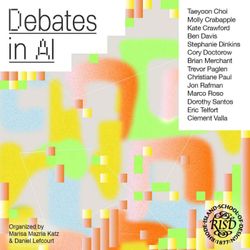
11. RISD Debates in AI: Dorothy R. Santos
15:25||Season 1, Ep. 11Dorothy R. Santos (she/they) was part of the Poetics of Computation panel. Dorothy is a multidisciplinary Filipino-American storyteller, poet, artist and scholar with a PhD in film and digital media from UC Santa Cruz. Their work spans voice recognition, assistive tech and feminist media histories, among other areas. Santos has exhibited at notable venues like Ars Electronica and Yerba Buena Center for the Arts, and her writing is featured in publications such as Art in America and Vice Motherboard. Currently, they are a visiting assistant professor at UC Santa Cruz, contributing to the Everett Program for Technology and Social Change.To watch talks from the two-day symposium, head over to AI-Debates.risd.edu. You can also listen to each of them wherever you find your podcasts. Support for the event was from the Divisions of Liberal Arts, Experimental and Foundation Studies, and Architecture & Design, as well as the Fleet Library and the Center for Arts and Language. Thank you to our largest contributor, the Center for Complexity and the RISD 2050 Fund for kicking off this important conversation.Audio produced by Andrew Grant and Marisa Mazria Katz Music: "Imagery" and "Last Night" by Xylo-Ziko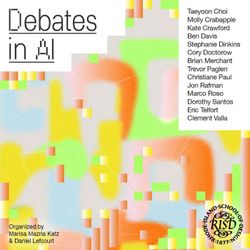
10. RISD Debates in AI: Christiane Paul
26:21||Season 1, Ep. 10Kicking off Debates in AI's final panel of the day, Poetics of Computation, was Christiane Paul. Paul is an acclaimed writer and curator specializing in new media arts, honored with the Thoma Foundation’s 2016 Arts Writing Award in Digital Art. Her key publications include A Companion to Digital Art and Digital Art, among others. As the adjunct curator of digital art at the Whitney Museum of American Art, she has curated such significant exhibitions as Cory Arcangel: Pro Tools and is behind artport, the museum’s Internet art platform. Paul’s curatorial projects extend internationally, with notable exhibitions such as Programmed at the Whitney and The Public Private" at The New School. To watch talks from the two-day symposium, head over to AI-Debates.risd.edu. You can also listen to each of them wherever you find your podcasts. Support for the event was from the Divisions of Liberal Arts, Experimental and Foundation Studies, and Architecture & Design, as well as the Fleet Library and the Center for Arts and Language. Thank you to our largest contributor, the Center for Complexity and the RISD 2050 Fund for kicking off this important conversation.Audio produced by Andrew Grant and Marisa Mazria Katz Music: "Imagery" and "Last Night" by Xylo-Ziko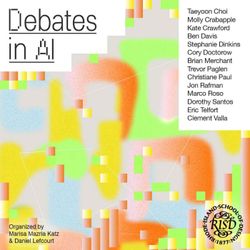
9. RISD Debates in AI: Cory Doctorow
01:11:32||Season 1, Ep. 9Debates in AI Keynote speaker, Cory Doctorow, is a prolific science fiction author, activist and journalist known for his critical views on Big Tech and surveillance. An advocate for digital rights, he works with the Electronic Frontier Foundation and holds positions as a visiting professor at Open University and UNC’s School of Library and Information Science. Following his lecture he sits down for a conversation and Q&A moderated by Artnet News National Art Critic and author Ben Davis.To watch talks from the two-day symposium, head over to AI-Debates.risd.edu. You can also listen to each of them wherever you find your podcasts. Support for the event was from the Divisions of Liberal Arts, Experimental and Foundation Studies, and Architecture & Design, as well as the Fleet Library and the Center for Arts and Language. Thank you to our largest contributor, the Center for Complexity and the RISD 2050 Fund for kicking off this important conversation.Audio produced by Andrew Grant and Marisa Mazria Katz Music: "Imagery" and "Last Night" by Xylo-Ziko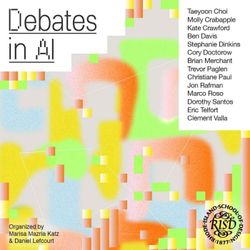
8. RISD Debates in AI: AI + the Artist Panel
21:39||Season 1, Ep. 8For the RISD Debates in AI panel AI + the Artist, contemporary artists Trevor Paglen, Stephanie Dinkins, and Elisa Giardina Papa discuss how their work engages machine learning technology. This conversation is moderated by Griffin Smith (Critic, RISD) and Q&A follows.To watch talks from the two-day symposium, head over to www.AI-Debates.risd.edu. You can also listen to each of them wherever you find your podcasts. Support for the event was from the Divisions of Liberal Arts, Experimental and Foundation Studies, and Architecture & Design, as well as the Fleet Library and the Center for Arts and Language. Thank you to our largest contributor, the Center for Complexity and the RISD 2050 Fund for kicking off this important conversation.Audio produced by Andrew Grant and Marisa Mazria Katz Music: "Imagery" and "Last Night" by Xylo-Ziko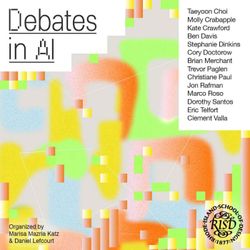
7. RISD Debates in AI: Stephanie Dinkins
18:38||Season 1, Ep. 7In this episode you'll hear from the artist Stephanie Dinkins who spoke on RISD's Debates in AI panel AI + the Artist. Stephanie is a transmedia artist focusing on race, gender, aging and future histories through AI and social collaboration, aiming for care-based, equitable technological ecosystems. Her work explores AI’s impact on communities of color, emphasizing the importance of stories and cultural perspectives as fundamental societal algorithms. Dinkins, who teaches at Stony Brook University as the Kusama Endowed Chair in Art, advocates globally for inclusive AI globally. She is a 2021 United States Artist Fellow and Knight Arts & Tech Fellow, with extensive recognition, including features in The New York Times and Wired. Her journey reflects a deep commitment to intertwining human narratives with technology, promoting compassion and equity in digital futures.To watch talks from the two-day symposium, head over to AI-Debates.risd.edu. You can also listen to each of them wherever you find your podcasts. Support for the event was from the Divisions of Liberal Arts, Experimental and Foundation Studies, and Architecture & Design, as well as the Fleet Library and the Center for Arts and Language. Thank you to our largest contributor, the Center for Complexity and the RISD 2050 Fund for kicking off this important conversation.Audio produced by Andrew Grant and Marisa Mazria Katz Music: "Imagery" and "Last Night" by Xylo-Ziko
loading...